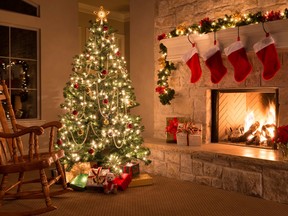How you cook, string up your lights and handle your Christmas tree can make a difference to the environment

A group of UBC academics has compiled a list of ways to ensure this Christmas has as little affect the environment as possible. Here are some key take-aways:
Recommended Videos
1. Avoid the fake trees
“Natural Christmas trees are more sustainable than artificial ones, which produce three times the emissions,” says Jiaying Zhao, associate professor in the department of psychology and the Institute for Resources, Environment and Sustainability. She also suggests renting potted Christmas trees.
Dr. Johan Foster, a professor of chemical and biological engineering, says most fake Christmas trees contain PVC that sheds microplastics indoors, which is not good for children or pets.
He says that when you recycle a natural Christmas tree, make sure you remove all the tinsel and decorations.
“After that, consider recycling. In Vancouver, curbside pickup is widely available. Or you can use the tree for mulch or compost to return nutrients to the soil. Trees can also be repurposed creatively or used as bedding or food for zoo animals,” he said.
Dr. Guangyu Wang, an associate professor in the faculty of forestry, suggests using a real Christmas tree and planting it in a biodegradable pot, which eliminates the environmental impacts of disposal, allows the tree to continue sequestering carbon and prevents methane emissions from trees decomposing in landfills.
2. Go easy on the gifts
Give fewer, meaningful low-impact gifts, says Dr. Kai Chan, professor at the Institute for Resources, Environment and Sustainability.
3. Travel less
Travel is a huge factor impacting sustainability during Christmas. Zhao thinks people should consider how to travel less during the festive season and to make the most of necessary travel.
4. Watch how you eat
“Opting for foods like chicken or plant-based options over beef and lamb can make a big difference,” says Zhao.
5. Did you know lights impact insects?
Daphne Chevalier, a master’s student in the faculty of land and food systems, is researching the impact of artificial lights on insects.
“When decorating for the holidays, extend your festive spirit to the animals that also call your neighbourhood home,” she says. “Opt for warm-coloured LED lights that don’t blink or change colour and try to place them in unintrusive spots, like under your eaves, rather than in important habitats like trees and bushes. Using a timer to turn lights off after everyone has gone to bed will also help protect animals while reducing energy costs.”